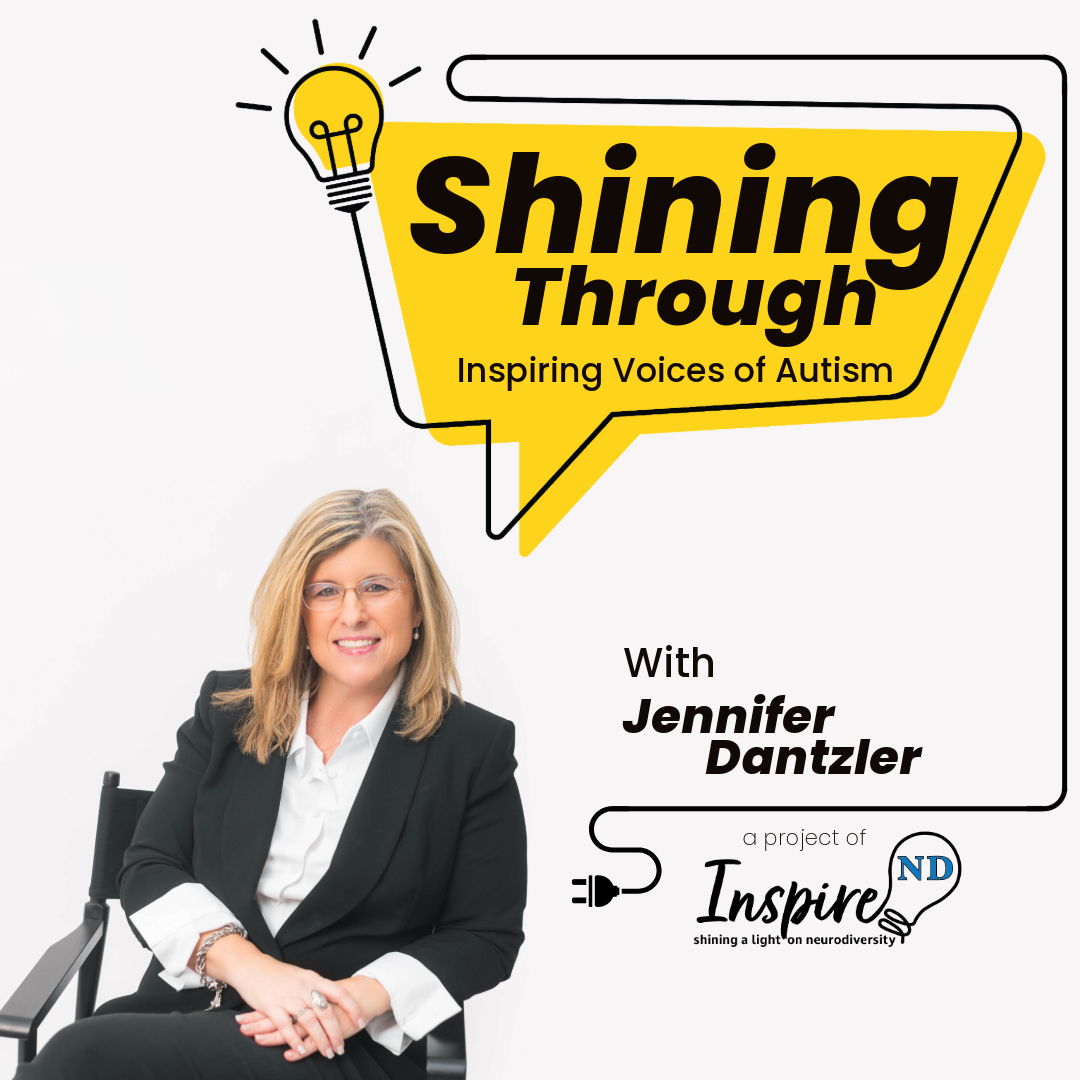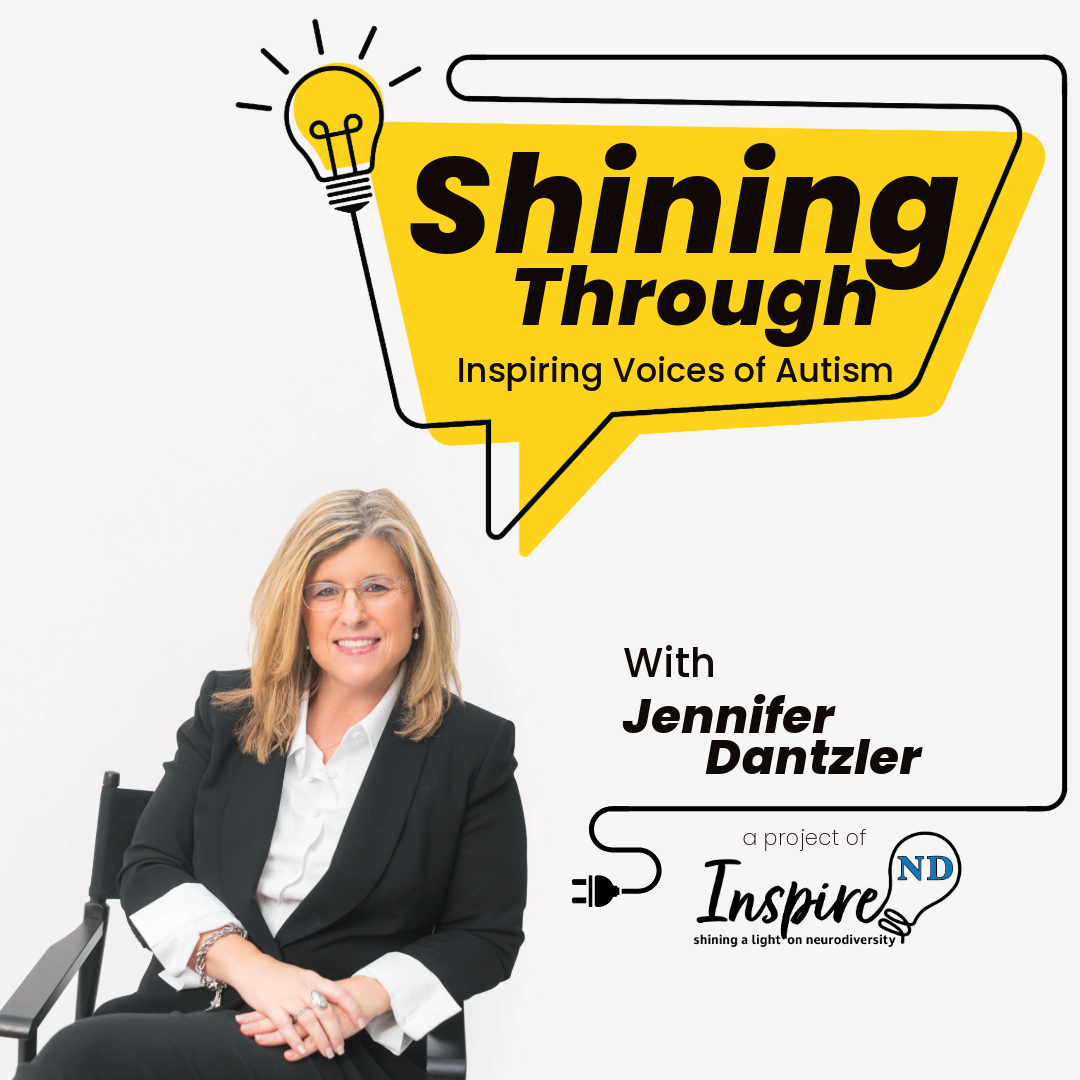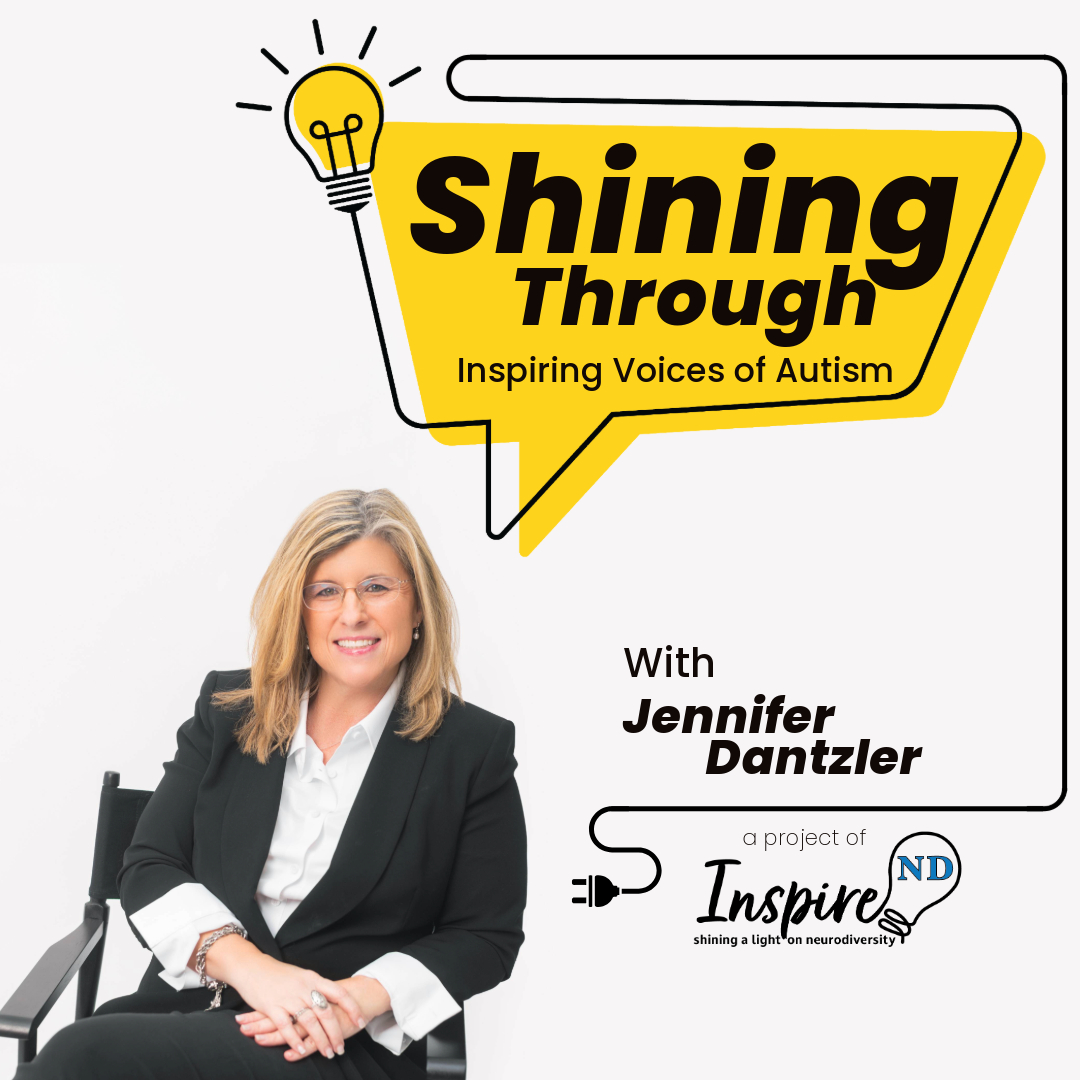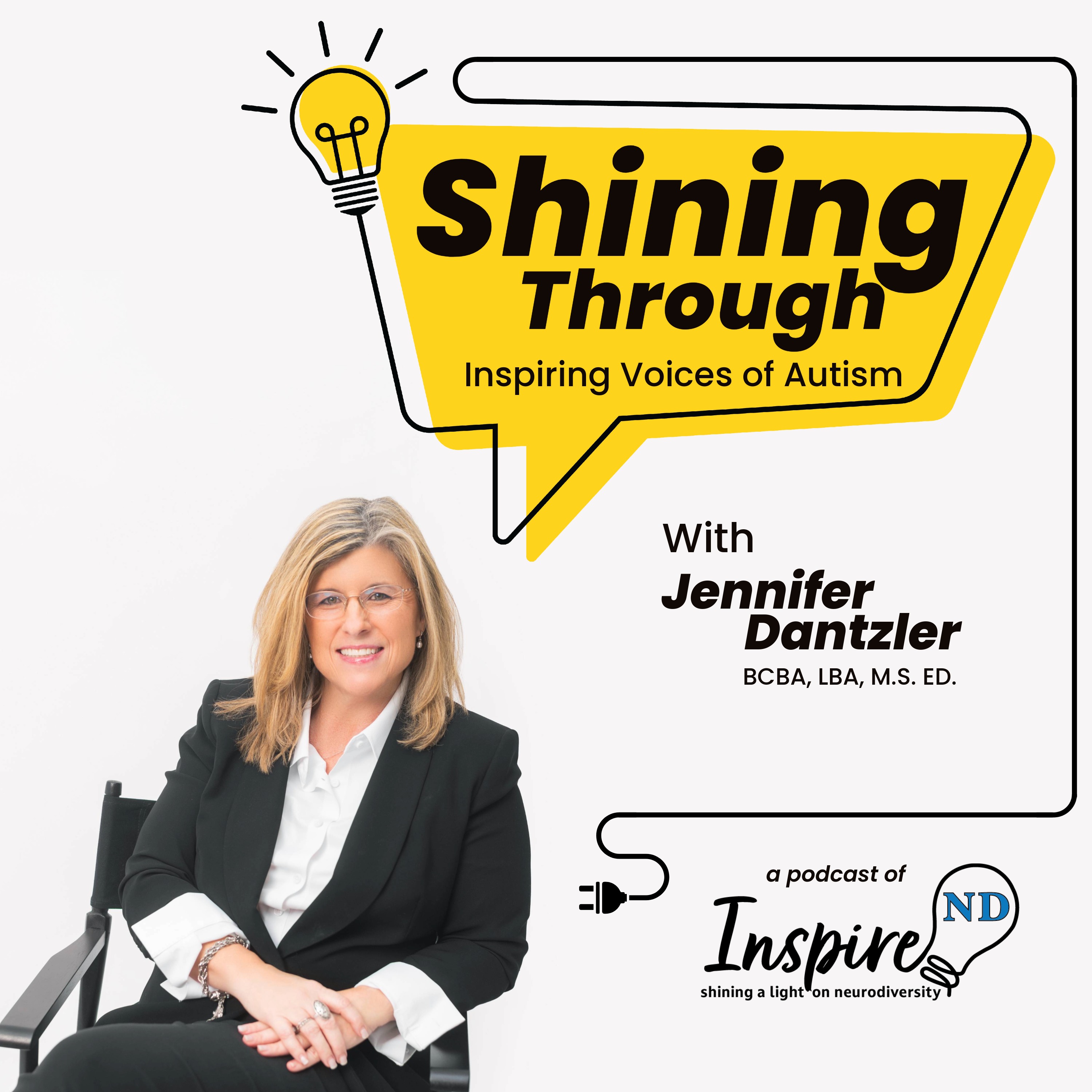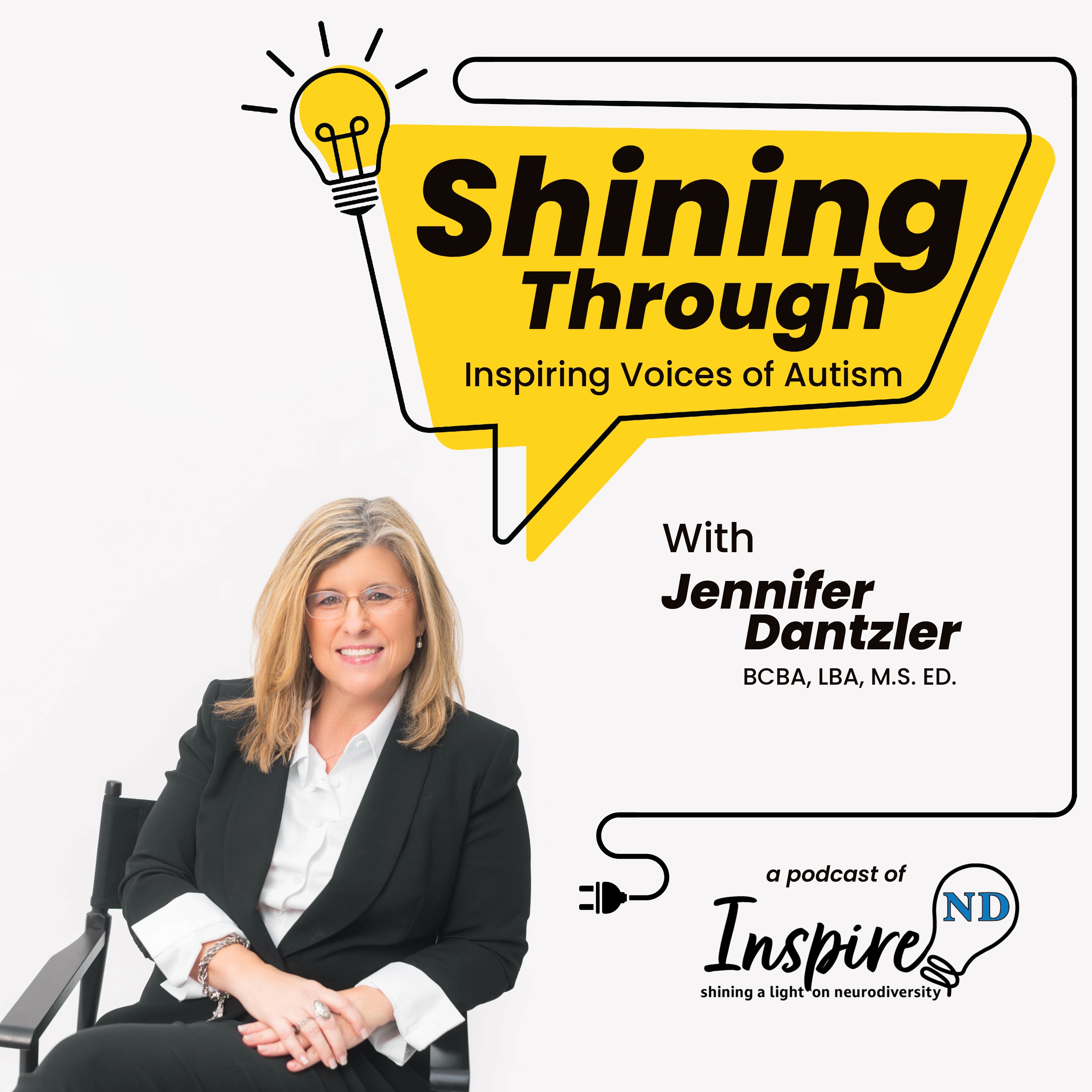[00:00:01] Speaker A: Welcome to Shining Inspiring Voices of Autism with show host Jennifer Dantzler. My name is Jack. I am in the autism spectrum and have Tourette syndrome. Thank you for taking the time to learn more about the world of autism. If you enjoy what you hear today, don't forget to subscribe to this podcast.
[00:00:17] Speaker B: Hey there, everyone. This is Jennifer Dantzler, and I'm the executive director and founder of Inspire nd, a nonprofit whose mission is to create truly inclusive communities through education and engagement. The goal of this podcast is to shine a light on real people and their stories in hopes of inspiring others who are on this journey of autism, either themselves, their child, their loved one, their coworker. I truly believe ignorance is not bliss, and we cannot be inclusive communities if we do not understand the people in the community. With autism now affecting 1 in 36 people, we need to get louder about this topic, and that's our goal during this podcast. We recognize that autism is a spectrum. There are a lot of people with a lot of different needs, a lot of resources available or none available. And we know that in every episode we can't meet everyone's needs for their specific interest. However, we hope that in each episode you do gleam some kind of insight as to how you can help your child or yourself be a better advocate. And as we go through our podcasts, our goal really is to address the entire spectrum, the various needs, the various environments that we're going to be in. And we hope that there's something in every episode for each one of you. So let's get started.
Now I have the pleasure of welcoming my guest, Dwayne Johnston. Dwayne owns a local Chick fil a. I've actually known Dwayne for about 14 years. His wife, Erica Johnson, has been on my podcast talking about their experience with their children in inclusive classrooms. And I'm now here to talk with Dwayne about his company because he employs people with neurodiversity. And so I'd like to just get a little bit of insight for you listeners on what it is to employ people with neurodiversity. What have been some of the victories? What have been some of the challenges? Okay, so Dwayne, thank you so much for being here. Can you first start with a little bit about the structure of your company, meaning the hierarchy, the org chart, what kinds of positions you have?
[00:02:19] Speaker C: I have a team of about 110 employees at my one location. And our structure kind of you kind of work your way up through a team member at an entry level. Then we Kind of work into team trainers, then they can develop into a team leader. Then we have some assistant directors and then a director level, which is kind of my executive top level that help me run certain divisions of the organization. The kind of buck stops with me.
[00:02:46] Speaker B: At the top, the big boss. In all those positions you mentioned, when and where that you know of. Have you had people with neurodiversity employed?
[00:02:55] Speaker C: So I believe I've had people with neurodiversities at pretty much every level. You know, some. Some will disclose to us and some will not. Those who have disclosed, I know of at least two or three of the levels we've had them at. And then the non disclosed. It's, you know, it's just kind of a learning that I've picked up that I think possibly I've had people at all levels.
[00:03:16] Speaker B: Okay, and how do you think having people with neurodiversity in your company has it created a better culture?
[00:03:23] Speaker C: So Chick Fil A's culture is all about care. So we want to be the world's most caring company. And to do that we have to care for our clients, our customers, but we have to care for our team. We're encouraging our team members every day to care for everybody like they were family, like they're a long lost relative, they haven't seen him forever and things like that. And to do that very well, I had to figure out how to care for my team and rapidly learned over the years and learning and meeting you guys. There's a high probability that many people on my staff have some type of diversity. It was getting interesting to work with some of them and learning the differences and how to lead them differently and to still get the desired results that we wanted.
[00:04:01] Speaker B: Can you think of a time when because of that investment you've made in them, that there was a specific example where your team did better, became better, was better because of some of those investments you had made?
[00:04:17] Speaker C: There's been one, one individual comes to mind specifically that was a graduate of one of the programs here at the local public school program. He worked with us in a internship kind of process with the school program there. And then we hired him as an employee after that. Speaking with him, the gentleman was in tears. And because he'd always been told he would never be employed anywhere, always, always told that no one would ever embrace him. He'd never work at a job, never make money doing anything. This young man is amazing. He's to work on time every day.
If his family can't get him there, he's still jumping into Uber. He's baking food for other employees. One of the girls birthdays was the other day, and he brought in her favorite type of cookie that he baked her. Just watching how he's been embraced by our team, they've just come to love and care on him as he's doing what he can do for our organization has just been amazing. And then now through the process of working with him, and now we've probably got six other graduates from that program that we work with with varying different levels of diversities. Just seeing how the teams kind of embrace them and just kind of bring them along, it's been. Been amazing.
[00:05:27] Speaker B: Do you find that? My experience has been that when people know someone has an autism diagnosis or a neurodiversity diagnosis, they give them a little bit more grace. But what always makes me think is, well, if you could give them grace, why can't we give everyone that grace? It really didn't take any extra effort. It didn't take any more time. It just was being a little bit more empathetic, a little bit more sympathetic. And I find that it's always just something that bewilders me of, why does it take a diagnosis to do that? Why can't we create that as a culture? But it sounds like it's almost infectious, right? That with the culture you're building to help support these neurodiverse individuals, it's just creating a better culture all around. Would you agree with that?
[00:06:17] Speaker C: I believe so. All around, the goals to make the entire culture better, as they've learned and seen from the top of the organization, that we embrace the differences, we embrace what they can bring to the team. They just want to belong like everybody else. We at Chick Fil A, we try to give, at my location, what we're trying to focus on daily is giving people a place to belong. Customers want to have somewhere to belong. They want to come in and relax and have a refreshing experience.
They come because they feel like they belong there. And we try to, you know, do that tenfold for our staff. They want somewhere to belong that they feel welcomed, that they feel loved, that they feel cared for, that they feel like they're making a positive impact. And as we've been able to embrace those with different diversities, it's been amazing to see how the smile brings to their face that they can come in. And I mean, the one individual, he only works about an hour and a half a day, about three days a week, but it is his favorite three days of the week that he does and it's what he can do. And when he's there he's making a difference and he's making friends and people love checking on him and seeing what he's been up to. And it's just been great to help give a place where people can just belong.
[00:07:28] Speaker B: Life is not all rainbows and unicorns. So let's talk about where some of the challenges have arisen with having such a neurodiverse set of employees.
[00:07:39] Speaker C: There, there's a few challenges. 11 from a customer perspective. Sometimes we have some customers who are not as friendly to or don't give the employees the grace that might move a little slower than the person beside them. So we've had a few times where we've had to step in and help those individuals kind of shield or embrace that team member a little bit from some of those customers that may not have been friendly because the person there was just working at a slightly different speed. Maybe the more challenging things that come more often I find is that when my my upper leadership are dealing with team members, it's quite common that a leader will and easily sometimes default to signing off. A person takes a little more time to work with them or you have to use a slightly different tactic to make them successful. The challenge is trying to teach that leader how to embrace the difference and how helping them understand and see what that employee can then bring when we embrace that and how and honestly embracing those individuals with autism on our staff, they're many times the most on time and they don't call in and they will do the job exactly how we've taught them to do the job.
And I have to remind our leaders that it's not challenging. Don't sign them off because it's taking you more time with them. Don't get frustrated with that because your job will be easier if you embrace what they can actually bring. And it's just a few of my leaders over the years have struggled a little more than others.
[00:09:16] Speaker B: I hear you. I think that's a very real scenario. What are some of the supports you have put in place? I know we've done some training for you, but it always amazes me when I talk to you about some of the things that go on. And Chick Fil a is a very fast paced environment and yet you have successfully been able to employ these people with neurodiversity in what might some almost call it a chaotic environment. What are some of the supports you've put in place to help them be successful?
[00:09:46] Speaker C: First one was actually Asking you guys to come do the training for my leadership. We brought you guys in, and my entire leadership team at the time spent time with y'all. With your Neurodiversity in the Workplace program you were doing. It really opened the eye for my leaders. I'd spent lots of time speaking with you and learning and volunteering with your organization and seeing different things that I was like, this is a program we would need. We need to help embrace. We need to learn how to embrace more people. And it was coming more and more prevalent to me that more and more people on my staff have some type of neurodiversity. I wanted to make the most welcoming environment for them and give them jobs and where they can feel successful in life, too. And so finding the different ways to work with those typically an example, we don't allow headphones. We do that for safety reasons. We do it for food safety reasons. We don't want them to fall on the food and different things like that.
But sometimes individuals need that because it's a little too loud, because our environment is loud. Our environment has a lot of beepers and alarms and can be very triggering for some individuals.
[00:10:49] Speaker B: It's.
[00:10:50] Speaker C: There's many times that it's very crowded. The one individual we have figured out a way to allow him to wear a corded headphone, and he wears it in just one ear. That just helps him focus a little bit. And then I have another one who is on the spectrum as well. And he made the accommodation, asks for us, and he works in our dining room. And so he's out there with customers all the time. But he found out that cleaning some of the lobbies, which were smaller spaces, and cleaning the bathrooms were.
It was louder in those rooms because a lot of people would walk through while he's in there. He didn't know at first he could keep his headphones and put those on to help muffle the sounds for him and things. And so we've just made the accommodations to allow him to do that. And we've shared with my leaders, my staff, why this person gets these accommodations. And it's been easy. Once we've taught them to ask and made sure they knew. Just ask for the accommodations. We can figure out some way. And so many times in business, you're taught in a lot of your management leadership books, treat everybody the same, and I just can't do that. If you embrace the differences, you can get a better end result.
[00:11:57] Speaker B: Have you seen any resentment from the other staff? For example, the headphones accommodation. Did any of the other staff mind that or did they understand because of the culture you built?
[00:12:08] Speaker C: I think I was afraid that there would be some of that because I'm working with mostly high schoolers and. And young 20s, and that's kind of generationally. Everything should be fair and they should all get the same thing. So I was afraid that was part of it. And I don't think we've had that. I think because they've seen what we're doing and what kind of environment we're trying to build that they very much have just gone with it and embraced it and said, hey, watching some of my younger leaders work with our individuals on the spectrum has been amazing to see how they've taken them under the wing and they have grown as an individual themselves because of the environment we've tried to help create. I think that's powerful to see.
[00:12:49] Speaker B: Very, very powerful.
One last question. What would you tell other employers who are considering hiring people with neurodiversity?
[00:12:58] Speaker C: Please do it. They need jobs. They need to work. They want to work. They are the most underemployed demographic out there. I have talked with lots of other Chick Fil A's and other people that I know that have businesses and encourage them to reach out to you guys for trainings and to look for the opportunities and ways to embrace and accept any accommodations needed. But so often in the hourly environment that we work with the hourly employee, they're not used to asking for those kind of things.
It's very much been ingrained into employees in our sector of work that you just got to go in there and do exactly what's there, and you can't get those accommodations. So they've been a little fearful to come. Employees have been fearful to apply, I think, at many businesses because of that. But I try to advocate a lot to the other businesses to reach out for the resources. They're out there, find them, connect with your organization, connect with Inspire, and it's very much helpful for them.
[00:14:00] Speaker B: Yeah, there's a whole world about psychological safety that we're trying to improve to create more nerdversity in the workplace. And so we will definitely be following up on that on future episodes. Well, Dwayne, I really appreciate you being here. Dwayne is a huge advocate for autism. I call him all the time, our volunteer of the year with Inspire nd and we can't thank him enough for being here, for being a voice of autism. We know we don't know what we don't know, and we hope that listeners learned a little bit more about the world of autism. I know Duo Duane would be happy to chat with you.
If you are an employer wanting to consider this and wanting to know all the ins and outs. If you need help or resources, whether you're a parent, someone on the spectrum, a business, a community organization and you want to know more or you need help or you want to share resources, please reach out to us at info and please subscribe to this podcast. We thank you for helping us get real for, for, about and with the Voices of Autism.
[00:14:59] Speaker D: Do you know the most important factor in your company's success? It's your people. They're the heart of your business. So how do you harness this potential? Insperity can help. From recruiting and onboarding to employee development and retention, we'll help you build a stronger, more resilient organization. See the difference the right approach to human resources can make? Because how UHR matters. Find out
[email protected] HR matters.
[00:15:27] Speaker A: Thanks for joining us on Shining Inspiring Voices of Autism. If you enjoy this episode, be sure to subscribe, leave a review and share it with others who want to celebrate neurodiversity. Until next time, keep shining.
